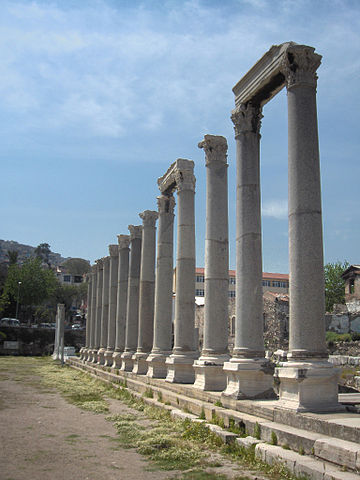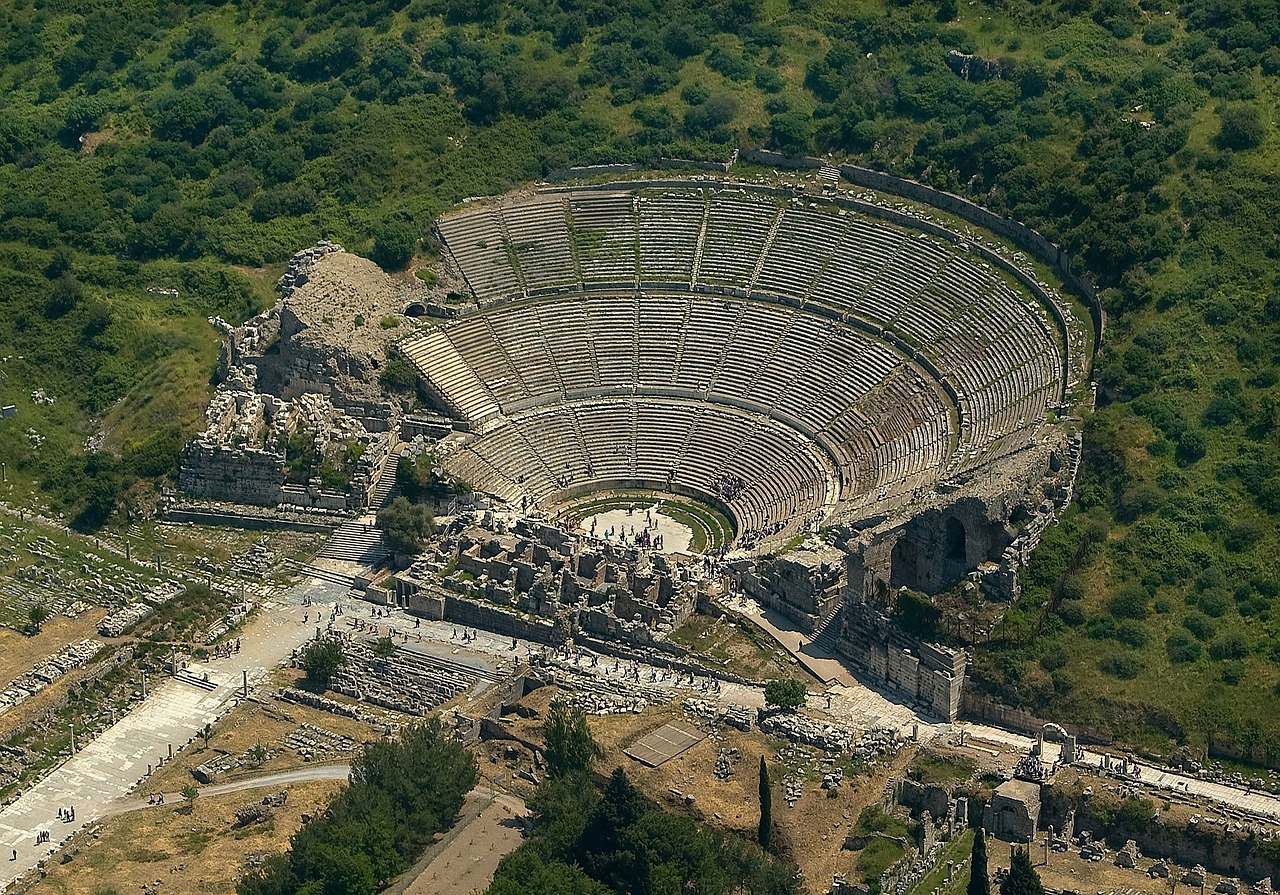Believers in Smyrna were poor but faithful, hated but loved. Frances Rabbitts unpacks the letter to this persecuted church.
"To the angel of the church in Smyrna write:
These are the words of him who is the First and the Last, who died and came to life again. I know your afflictions and your poverty – yet you are rich! I know the slander of those who say they are Jews and are not, but are a synagogue of Satan. Do not be afraid of what you are about to suffer. I tell you, the devil will put some of you in prison to test you, and you will suffer persecution for ten days. Be faithful, even to the point of death, and I will give you the crown of life.
He who has an ear, let him hear what the Spirit says to the churches. He who overcomes will not be hurt at all by the second death." (Rev 2:8-11)
Revelation was received, written and circulated during a time when Christians across Asia Minor faced increasingly heated persecution – hence its reliance on symbolic language that non-believers would not understand.
Whilst an emphasis on persecution and trial runs right through the whole Book of Revelation, the letter written to the church in Smyrna is particularly devoted to encouraging believers to stand firm in the face of a coming onslaught, during which many would have been imprisoned, tortured and killed.
 Great Fire of Smyrna, 1922.The words would have spoken incredibly clearly to believers at the time – and they have lost none of their relevance through the years. The last time believers in Smyrna were attacked en masse was actually in the 20th Century – in 1922, when incoming Turkish soldiers slaughtered tens of thousands of Christians (causing 1.5 million more to flee as refugees) - far more than would ever have died under Rome.1
Great Fire of Smyrna, 1922.The words would have spoken incredibly clearly to believers at the time – and they have lost none of their relevance through the years. The last time believers in Smyrna were attacked en masse was actually in the 20th Century – in 1922, when incoming Turkish soldiers slaughtered tens of thousands of Christians (causing 1.5 million more to flee as refugees) - far more than would ever have died under Rome.1
Today the words have great poignancy for the millions of Christians worldwide suffering for the faith – and are yet relevant to the whole Body, for "if one part [of the Body] suffers, every part suffers with it" (1 Cor 12:26). As we will also see, its exhortations apply in a spiritual way to all believers, whether they are undergoing trials in this life or not.
The last time believers in Smyrna were attacked en masse was actually in 1922, when Turkish soldiers slaughtered far more Christians than would ever have died under Rome.
Ancient Smyrna The agora in modern Izmir, Turkey.
The agora in modern Izmir, Turkey.
Smyrna (modern-day Izmir, named in 1930 – simply the Turkish rendering of the Greek name) was an ancient Greek seaport on the coast of Asia Minor (about 50 miles north of Ephesus) and a leading city in Greek antiquity. Situated in a sheltered valley between the mountains and the sea, like Ephesus, Smyrna was at the mouth of a great Anatolian trade route. Today it is still an industrial transit city - but known more for its urban sprawl than for its historic glory.
The oldest city on the Aegean coast and founded by the Hittites, Smyrna experienced large-scale migration from the Greek mainland c.1200 BC, completely transforming its cultural fabric. It grew in splendour and was 'talent-spotted' by Alexander the Great in the 4th Century BC, who deliberately rebuilt the city on the opposite side of the bay to take advantage of the view.
This more 'modern' Smyrna had all the advantages of a purpose-built Greek city – gym, stadium, theatre and broad, well-paved streets.2 The city's main street extended from the temple of Zeus in the west to that of Cybele in the east. When governance of Smyrna was transferred peacefully to the Roman Empire in 133 BC, Greek buildings and architecture were not destroyed, but adapted and extended.
The Christians Community in Smyrna
By the time the Gospel arrived, Smyrna was a bustling, prosperous, polytheistic city of many magnificent temples and a fusion of cultures. Smyrna had a Christian population from very early on, the seeds of which were planted and watered by Bishop Polycarp, who was instructed and appointed by the early apostles and later martyred. Smyrna's initial group of Jewish converts grew rapidly into a larger community of both Messianics and Gentile believers.
Believers were not necessarily rich (hence the mention in the letter of their apparent 'poverty'), but they were liberated from the shackles of Greco-Roman religion, into which the Gospel spoke as a breath of fresh air. By the time Revelation was written, there were at least 500 churches in the region; the Gospel was having great success.
By the time the Gospel arrived, Smyrna was a bustling, prosperous, polytheistic city of many magnificent temples and a fusion of cultures.
Spread of Persecution
As the faith flourished, however, so Christianity began to be perceived as a threat, both to the traditional pagan religions of Rome and to orthodox Judaism.
Christians in the Roman Empire were initially tolerated as a Jewish sect, but as the faith spread amongst Gentiles and the differences between Christians and Jews who had not accepted Jesus as Messiah became increasingly observable to outsiders, civic authorities turned against the believing community. Christians were painted as trouble-makers and subversives, refusing to acknowledge the supremacy of Caesar, worshipping in private (rumours abounded) and declining participation in pagan festivals.
Persecution under Nero in the 60s AD (during which Peter and Paul likely were both martyred) was mercifully brief, but took a more serious and widespread turn under Domitian, who enforced the practice of 'Lord's Day' - when all citizens had to declare 'Caesar is Lord' or face terrible persecution – and when John, banished to Patmos by Roman officials, received the Revelation from Jesus.
The Letter to the Church in Smyrna
The letter to the church in Smyrna would have been received during a time of great persecution, likely under Domitian. It is unsurprising, then, that its central aim is to strengthen and encourage believers, whilst being frank about the coming trials. The Lord Jesus does not mince words, deny facts or try to paint a rosier picture to quell the fears of his beloved ones – he clearly states that trouble is coming, and will be tough, but that the crown of life to be won will be worth the fight.
Christians, increasingly isolated and targeted by both Rome and some more militant groups of orthodox Jews (hence Jesus's mention of the 'synagogue of Satan'), lived in daily fear of false accusations and even infiltration of their churches by those who would betray them to officials. The letter gives a prophetic warning of "ten days" of trial, not unlike Daniel and his companions in Babylonian captivity, who publicly put themselves to the test for ten days to prove that God could sustain them on a diet of vegetables and water.3
The ten days mentioned for Smyrna may have been literal, or symbolic, or both – but the principles behind the Lord Jesus's encouragement echo down through the ages to all believers undergoing suffering: this is an opportunity to let the fire of testing prove the capacity of God to sustain his beloved children; for them to learn that though they may have nothing in the eyes of the world, in the eyes of Heaven they have everything (see Gal 4:6-7). Though they should expect to be hated by those who still belong to the evil one, they should also know that they are enduringly loved by the One who is victorious above all.
The Lord Jesus does not paint a rosier picture to quell the fears of his beloved ones – he clearly states that trouble is coming, but that it will be worth the fight.
Do Not Be Afraid - Be Faithful
Unlike the other letters, the one addressed to those in Smyrna has no rebuke or call to repentance. These were beloved children undergoing – and about to undergo further - immense difficulty. There is a sense here of the Lord Jesus coming alongside his brothers and sisters in solidarity, reassuring them that he knew of their circumstances and encouraging them to endure, faithfully (also John 14:18). How often do we cry out to the Lord to relieve us of our trials, instead of humbly recognising that he might require us to walk with him through the valley, rather than around it – even though he knows our suffering and cares deeply about our pain?
As the Father did not relieve the Son of the cup of suffering, so often we too must drink from it, for the eternal joy set before us. In fact, the letter itself puts everything in perspective, beginning as it does by addressing the Lord Jesus as "him who is the first and the last [the Alpha and Omega], who died and came to life again": the same words Jesus also used to reassure John when he was afraid at the beginning of the Revelation vision (Rev 1:17-18).
The perspective here is clear: the Lord Jesus IS LORD OF ALL and had already gone ahead of us, through death, emerging victorious. Like the other letters, this one also refers to those who 'overcome' the trials at hand – those who follow Jesus into his victory - who are "more than conquerors" according to Romans 8:37.4
Persecution Today
Today our brothers and sisters around the world need our prayers and aid more than ever, as Sunday's terrible slaughter of worshippers in Cairo demonstrates. The number of Christians killed in the last year almost doubled on 2015 figures, exceeding 7,000 according to Open Doors' conservative figures - and this is without counting atrocities in Syria, Iraq and North Korea, where accurate records are not kept.5
The number of churches attacked and destroyed has also more than doubled in the last year, and millions of Christians are on the move around the world as refugees fleeing religious violence. The greatest source of persecution continues to be religious extremism – not just Islamic, but also Hindu and Buddhist.6
Meanwhile, the Western Church is just beginning to feel the pinch of an intolerant secular humanist culture, and many discern the Lord at work sifting too-comfortable church-goers by allowing various deceptions to proliferate, including liberalism and new age occult. But for the most part, we in the West in this generation do not know what it is to suffer the fires of persecution. That road may lie ahead for us, as yet untrodden. Furthermore, we are also largely ignorant of the suffering of other parts of the Body around the world.
As the Father did not relieve the Son of the cup of suffering, so often we too must drink from it, for the eternal joy set before us.
Life Through Death
Yet, the message to Smyrna is actually relevant to all believers everywhere – not just those undergoing dreadful persecution. There is a process that God wants every Christian to undergo, regardless of where they are in the world, how materially blessed they are or what difficulties they face: it is that costly process of refining that feels very much like trial on the inside (whether or not it looks like it on the outside), and is with eternal and Divine purpose. For our God disciplines those He loves, desiring that they be purified by holy fire, even though this process might be painful.
In this sense, every believer is called to a life of suffering, as our flesh-life is put to death that the new, eternal life in the spirit might grow and flourish. We are therefore to expect 'trouble' in this life (John 16:33), both within and without. God's desire is to purify us to such an extent that when he has finished, no earthly trial can stand against us or stop our light from shining.
David Wilkerson unpacks another facet of this: he talks about God wanting to share his heart of grief with those who are willing and hungry to walk closely with the Lord Jesus.7 This is the road less travelled, which includes sharing in the Lord's own heart for this broken world and allowing ourselves to be brought low by it, counting it all as heavenly privilege that we get to somehow participate in what Jesus himself went (and still goes) through.
This is the honoured road along which I believe God shepherds all believers who diligently and wholeheartedly seek him. As missionary Helen Roseveare, who died last week, said: "God never uses a person greatly until He has wounded him deeply."
Today our brothers and sisters around the world need our prayers and aid more than ever.
'The Privilege is Greater than the Price'
The world is approaching a critical point – so many things are on the verge of complete collapse – even unbelievers sense the severity of the age. The Lord is looking for those who love him enough to give up their worldly desires and aspirations, to the point of laying down their very lives, submitting themselves to his process of refining and saying always "Thy will be done", even when it hurts.
But let us take heart, as those in Smyrna hopefully also did: for those who overcome will not be hurt at all by the second death, but will be given the crown of life by "him who is the First and the Last, who died and came to life again". Ultimately, to quote Helen Roseveare again, "The privilege He offers you is greater than the price you have to pay. The privilege is greater than the price."
References
1 See Hill, C & Hill, M, 2005. Ephesus to Laodicea. Handsel Press. This is a fantastic biblical guide to the Revelation churches written particularly for those visiting the region. It is highly recommended as accompanying reading for this series.
2 See Wikipedia's page on Smyrna for a brief history.
3 Lehman, R. "And ye shall have tribulation ten days". 17 October 2008.
4 See note 1.
5 Persecution: The Key Facts. Open Doors.
6 Ibid.
7 Wilkerson, D, 1992. Hungry for More of Jesus, chapter 3. One Pound Classics.
Click here for the the rest of the articles in this series.





